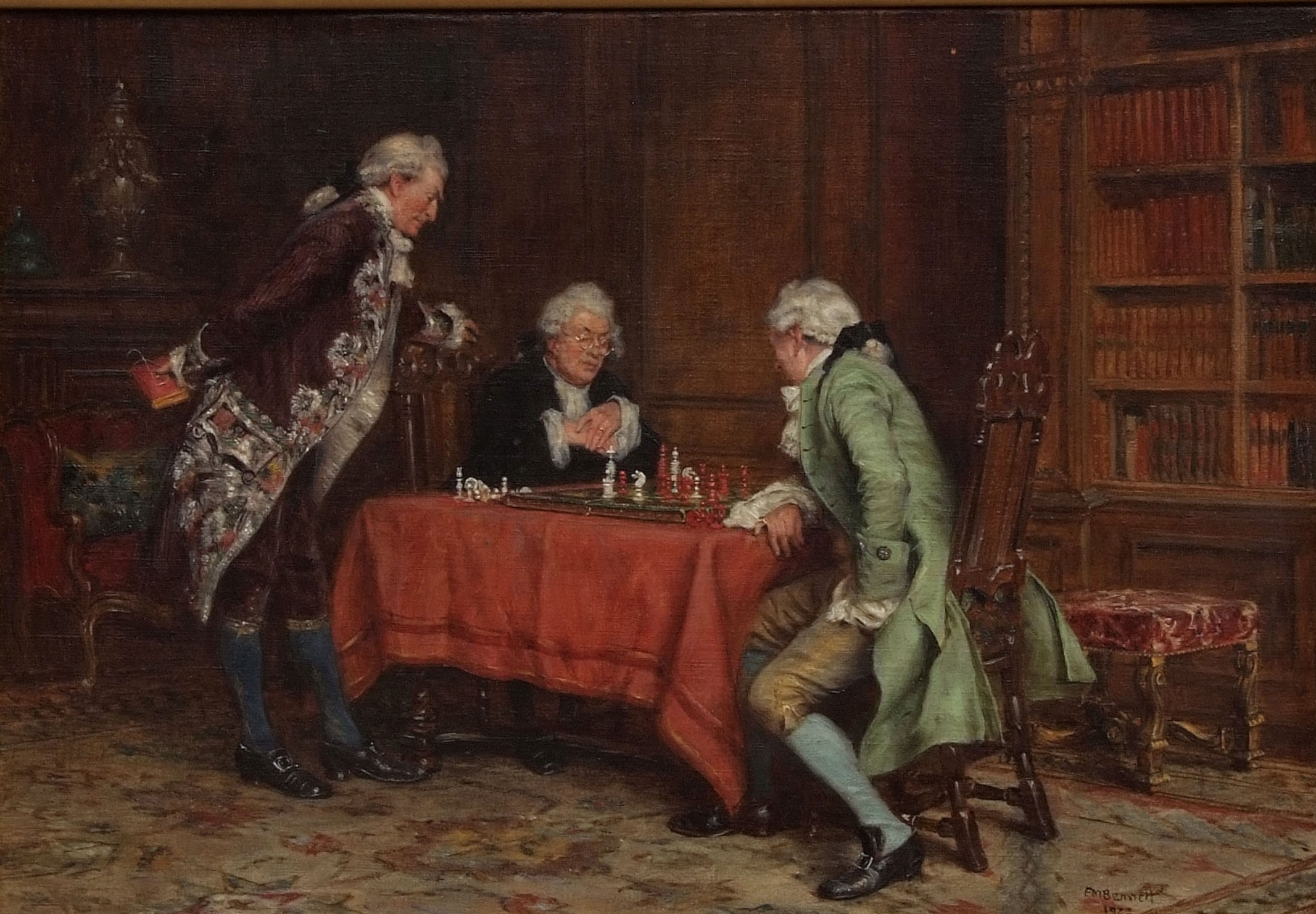
Nearing the end by Frank Moss Bennett, 1922
Playing at chess is the most ancient and most universal game known among men; for its origin is beyond the memory of history, and it has, for numberless ages, been the amusement of all the civilized nations of Asia – the Persians, the Indians, and the Chinese. Europe has had it above a thousand years; the Spaniards have spread it over their part of America; and it has lately begun to make its appearance in the United States.[1]
Benjamin Franklin, “The Morals of Chess” 1779
One of the most popular and novel games among educated citizens in colonial America was chess, and one of its most prominent advocates was the polymath and Founding Father Benjamin Franklin. In October of 1776, shortly after the Declaration of Independence was signed launching the Revolutionary War, Franklin was sent to France as a commissioner with the task of securing aid from that country. Sometime in 1779, one year after effecting a military alliance with France, Franklin wrote a short piece titled, “The Morals of Chess,” which was later published in 1786 following his return to America.
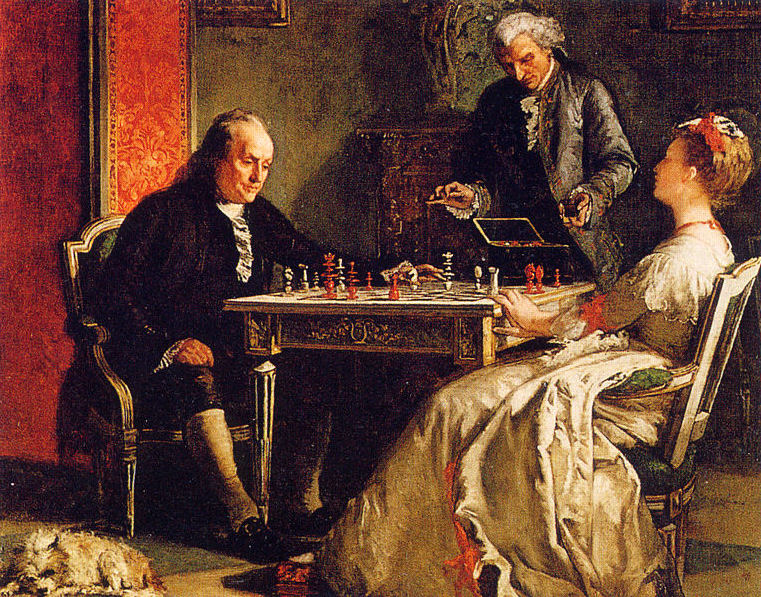
Chess was a major factor in his social life while living in Passy, a suburb on the outskirts of Paris, and he was known to play with neighbors and officials into the wee hours – often until he ran out of candles. One source of inspiration for his essay may have been General Horatio Gates of the Continental Army. In early June of 1779, after learning of Gates’s victories over British general John Burgoyne at Saratoga in the fall of 1777, Franklin wrote him, elated that…
The pride of England was never so humbled by anything as by your capitulation of Saratoga… All the happy effects of that transaction for America are not generally known. I may some time or other acquaint the world with some of them. When shall we meet again in cheerful converse, talk over our adventures, and finish with a quiet game of chess?[2]
“The most ancient and most universal game”
As Franklin noted in his essay, chess was relatively new to the colonies, and was introduced there by the Spanish, who had been familiar with the game since it was brought to Iberia by Arab conquerors in the 8th century.
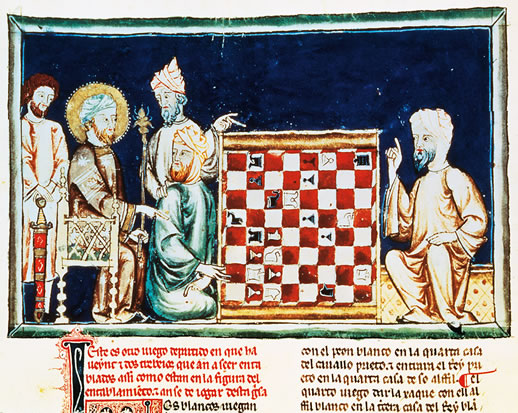
Some of the rules changed over time, including the importance and power of the queen, but when it finally arrived in colonial America, it was nearly the game we know it as today. In his 1913 work, A History of Chess, British schoolmaster and advocate of the left-handed, Harold J.R. Murray, concluded after more than ten years of research that the origins of the game lay somewhere in India:
The broad lines of the diffusion of chess from India are fairly clear. Its earliest advance was probably westwards to Persia; the eastward advance appears to have been rather later, and at least three lines of advance may be traced. One route took the game by Kashmir to China, Corea, and Japan. A second, possibly the same route by which Buddhism travelled, took chess to Further India… The route by which the game reached Tibet and the Northern tribes of Asia is still doubtful. Persia had meanwhile passed on chess to the Eastern Roman Empire, and, as a result of the Muhammadan conquest of Persia, Islam learnt the game. Henceforward the Muslims became the great pioneers of chess, carrying their game as far west as Spain, and east to India where they imposed the Arabic nomenclature on the Northern and Central Provinces of the Peninsula. Christian Europe had begun to learn chess from the Moors as early as 1000 A.D. From the Mediterranean shores it spread northwards over France and Germany to Britain, to the Scandinavian lands, and Iceland.[3]
“The Morals of Chess”
Author of ‘Thirteen Virtues’ (c. 1728) when he was in his early twenties, Franklin approached the game of chess from a moralistic perspective – applying what he had learned in his eclectic life with facets of the game.
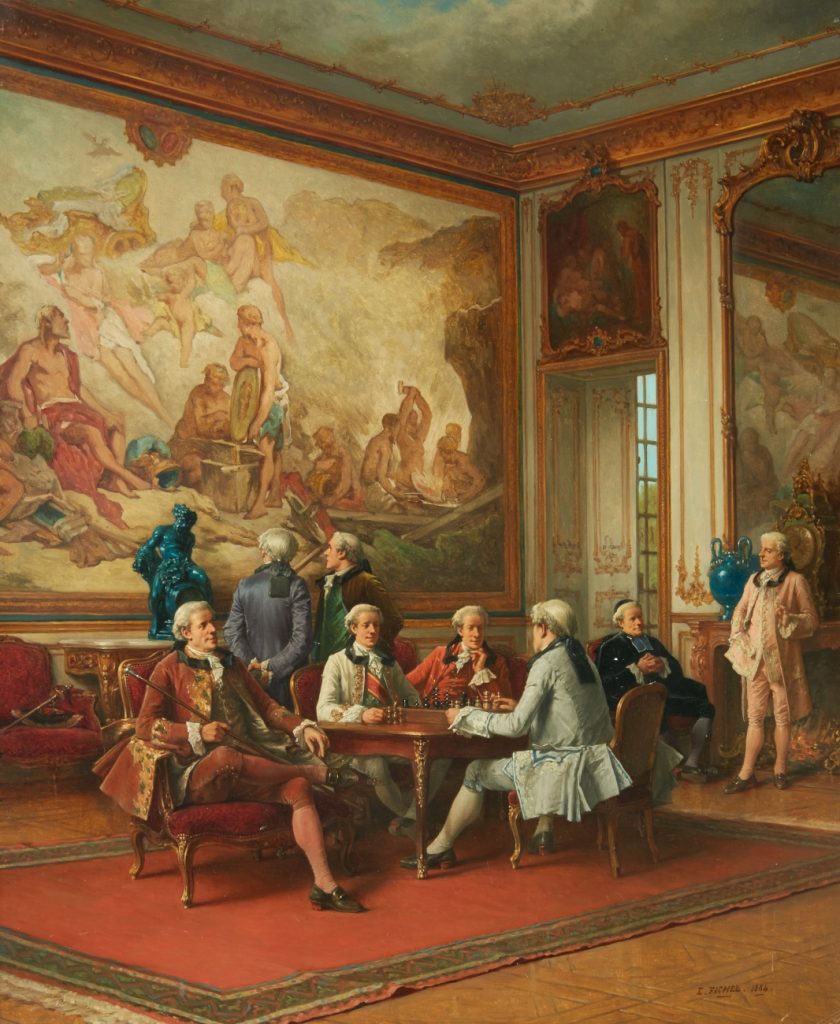
He thought it “so interesting” that it was “seldom played for money. Those, therefore, who have leisure for such diversions, cannot find one that is more innocent…” Franklin believed essential virtues were inherent in the game, which made it not only fun but instructional for the improvement of oneself:
The game of chess is not merely an idle amusement. Several very valuable qualities of the mind, useful in the course of human life, are to be acquired or strengthened by it, so as to become habits, ready on all occasions. For life is a kind of chess, which we have often points to gain, and competitors or adversaries to contend with, and in which there is a vast variety of good and evil events that are in some degree the effects of prudence or the want of it.[4]
Topping Franklin’s list of morals was “Foresight, which looks a little into futurity and considers the consequences that may attend an action…” The second was “Circumspection,” which in this case may be considered ‘attentiveness,’ which teaches to examine “the whole chess board, or scene of action; the relations of the several pieces and situations, the dangers they are respectively exposed to…” Franklin listed “caution” as a moral as well. Albeit similar to ‘circumspection’ in many ways, Franklin elaborated that caution teaches…
…not to make our moves too hastily. This habit is best acquired by observing strictly the laws of the game, such as, ‘If you touch a piece, you must move it somewhere; if you set it down, you must let it stand’; and it is therefore best that these rules should be observed, as the game thereby becomes more the image of human life, and particularly of war, in which, if you have incautiously put yourself into a bad and dangerous position, you cannot obtain your enemy’s leave to withdraw your troops and place them more securely, but you must abide all the consequences of your rashness.[5]
War and Peace: A Diplomat’s Game
Franklin offered other examples on the morals of chess, but it is apparent his time spent as a diplomat in France during arguably the most historic war of the eighteenth century informed his opinions. He wrote, “you must not, when you have gained a victory, use any triumphing or insulting expression, nor show too much pleasure, but endeavor to console your adversary, and make him less dissatisfied with himself by every kind of civil expression that may be used with truth…”
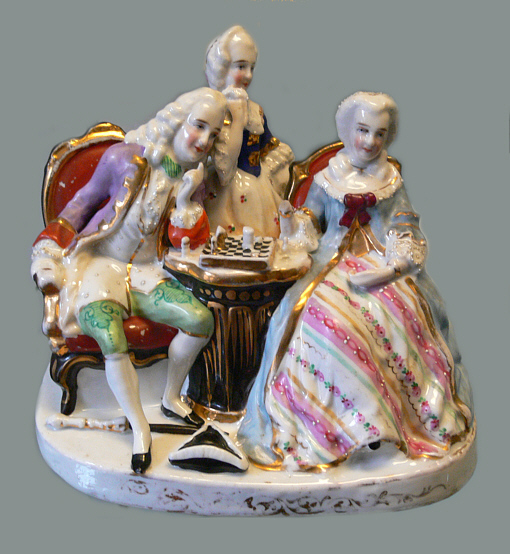
Some of these linguistic niceties – so essential to preserving relationships, egos, and ultimate peace – included: “‘You understand the game better than I, but you are a little inattentive’; or, ‘You play too fast’; or, ‘You had the best of the game, but something happened to divert your thoughts, and that turned it in my favor.’” In other words, Franklin was writing about how to treat an enemy who may someday be turned into an ally:
Lastly, if the game is not to be played rigorously, according to the rules above mentioned, then moderate your desire of victory over your adversary, and be pleased with one over yourself. Snatch not eagerly at every advantage offered by his unskillfulness or in attention; but point out to him kindly, that by such a move he places or leaves a piece in danger and unsupported; that by another he will put his king in a perilous situation, etc. By this generous civility… you may, indeed, happen to lose the game to your opponent; but you will win what is better, his esteem, his respect, and his affection, together with the silent approbation and good-will of impartial spectators.[6]
[1] John Bigelow, ed., The Works of Benjamin Franklin, vol. 6, 1776-1779 (New York: G.P. Putnam’s Sons, 1888), 255–6. “Morals of Chess.” The text reads, “Playing at chess is the most ancient and most universal game known among men; for its original…” This author is assuming the Bigelow erred.
[2] Bigelow, ed., The Works of Benjamin Franklin, vol. 6, 409–10. June 2, 1779. See: “The Morals of Chess”, [before 28 June 1779],” Founders Online, National Archives, https://founders.archives.gov/documents/Franklin/01-29-02-0608
[3] H.J.R. Murray, A History of Chess (1913, Reprint: Oxford: Clarendon Press, 1962), 29. Murray also outlined the evolution and modern use of the queen as a powerful piece: “We see from this that the ‘Queen’s leap’ had penetrated to some forms of Muslim chess. This addition to the power of the old Fers or Queen and to that of the promoted Pawn had already been made in some forms of European chess before 1300, and was adopted generally in the 14th c. By 1500 a different move for the Queen was in use in Spain and in Italy, and the older move was probably obsolete in the Mediterranean lands by 1560.” (p. 353) It is also likely that Vikings initially learned of chess through their interaction with Byzantium.
[4] Bigelow, ed., The Works of Benjamin Franklin, vol. 6, 256. For the ‘Thirteen Virtues,’ see: Benjamin Franklin, The Autobiography of Benjamin Franklin (Boston and New York: Houghton Mifflin & Company, 1906), 86–7: Temperance, silence, order, resolution, frugality, industry, sincerity, justice, moderation, cleanliness, tranquility, chastity, humility (“Imitate Jesus and Socrates.”)
[5] Ibid. 256–7.
[6] Ibid. 257–60.
About the author
Based in South Korea since 2008, Benjamin J. Swenson is a professor at Hoseo University in Asan. He holds a PhD from Pompeu Fabra University in Barcelona, Spain, where his dissertation addressed 19th-century Euro-American military history. His work has appeared in the Journal of Military History, and his most recent, The Dawn of Guerrilla Warfare (2023), was published by Pen & Sword. Its follow up, Wars of the Mexican Gulf, will be published in 2024. His hobbies include Viking sagas and chess.